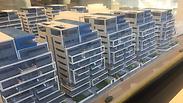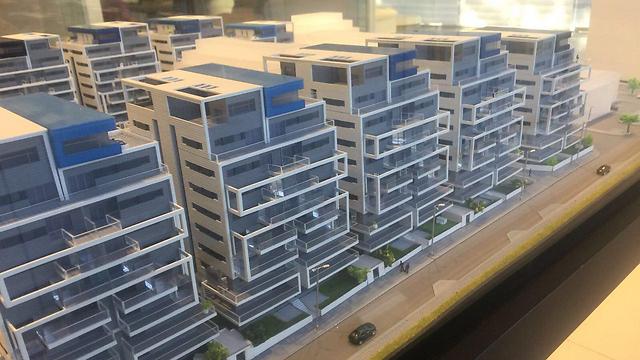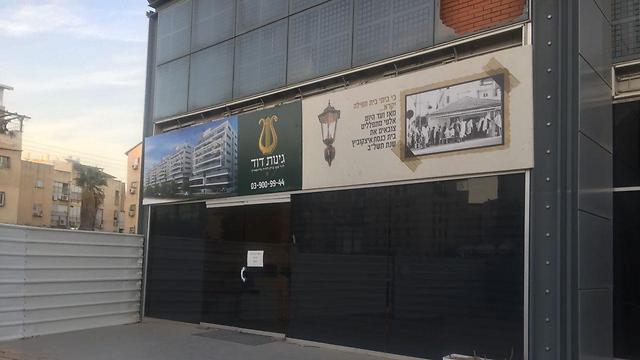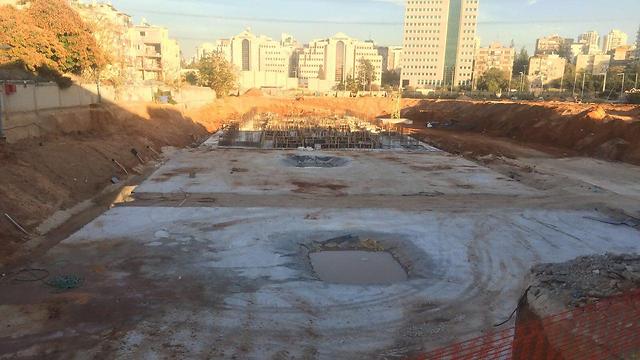

Housing project discriminates against Sephardic Jews
Yedioth investigative report reveals Sephardic and Mizrahi Jews inquiring about apartments at the David's Gardens project in Bnei Brak have either been told there are none available, or offered lesser homes; rejected buyers to file class action suit; company denies discrimination.
Mizrahi and Sephardic Jews seeking to buy homes in the "David's Gardens" housing project in Bnei Brak claim they have been discriminated against.
The project, named after David Lubinsky of the Lubinsky Group, is currently being built in an area between HaRav Kahanman Street and Highway 4.
Yedioth Ahronoth and Ynet have received numerous complaints alleging the Lubinsky Group sales representatives and private investors were doing everything in their power to avoid having to sell apartments to anyone who is not Ashkenazi.
A Yedioth journalist calling to ask about apartments under the Mizrahi last name Hadad was told there were no apartments available. "Try in three or four months," the sales representative, Tzipi, advised.
When calling again, this time under the distinguished Ashkenazi name Sternbach, Tzipi was much more courteous and offered one of the nicer apartments available.
When asked what kind of population is expected to live in the 500 housing units in the complex, Tzipi answered: "Very homogeneous. Fifty percent Lithuanians, 50 percent Hasidic."
And what about Sephardic and Mizrahi Jews? "There are some," Tzipi replied with some trepidation. "Very few."
A close acquaintance, who tried himself to buy an apartment in David's Gardens, said some apartments were sold to Sephardic and Mizrahi Jews, but only on the sixth floor. Meaning, apartments a Haredi family would have a hard time living in, as the elevators do not operate on Shabbat, making it hard to get in and out of the apartment with young children in strollers.
A Yedioth journalist dressed as a Haredi yeshiva student and introducing himself as having the last name Uzon was then sent to visit the sales offices in person.
He told Tzipi he had an apartment in Rishon LeZion worth a similar sum to the one he wanted to buy, and that he sought to move to Bnei Brak because he wanted to send his children to the schools in the city.
Tzipi told him she could only offer him apartments on the sixth floor. "We sold all of the apartments from the first to the sixth floor, except for an apartment or two I still have on the sixth floor," she said.
When the yeshiva student with the Mizrahi name told her he wanted an apartment in a lower floor, as it would be hard for his family on Shabbat when there are no elevators, she responded: "Are you sure you want this area?" and offered a different area of the city, where she said he could get a nice apartment with a garden.
After Uzon left the sales office, I, Ariela Sternbach, arrived there and asked to see the construction plans. Tzipi showed me a model of the new neighborhood. When asked about apartments on the lower floors, she said: "I have some of those, four-room apartments."
When I asked again about the neighbors, wondering if there are any Mizrahi Jews, she answered: "There are almost none of them, and even when there are—they are really God-fearing people."
I left the sales office and returned several minutes later, telling her I met a yeshiva student called Uzon outside, who told me there were only apartments on the sixth floor left.
"It must have been someone we didn't think was suitable," Tzipi explained. "Who did you meet? Who was it?"
He said his name was Uzon, I responded.
"Uzon, that's it. Because he's that too," she said.
What do you mean, "that too"? I asked.
"Sephardic. We don't give them a lot (of apartments). We have a certain quota."
The "David's Gardens" project said in response: "The David's Garden company is successfully marketing apartments to the entire Haredi population, regardless of ethnic group or class. A testament to that is the mix of different contracts signed in this project, which includes members of all ethnic groups and classes, including many Mizrahi Jews.
"The article is trying to create a false presentation of the rejection of Sephardic clients based on excerpts from conversations that were systematically taken out of context. Unfortunately, there are some who interpret the supply of apartments running out on certain floors as rejection based on ethnicity."
The Bnei Brak municipality said that after looking into the matter, it was found that "the project is selling apartments both to Ashkenazi and Mizrahi Jews. The municipal permits deal with, in accordance with the law, only matters of planning and construction and not with the makeup of the population in these buildings."
Class action against project developers
Several of the rejected potential buyers said following the publication of the Yedioth investigative report that they intend to file a class action against the project developers for discrimination.
"This is an outrageous violation of human dignity and the principle of equality," said attorney Oded Gazit, whose law firm represents one of the rejected buyers. "We were presented with unequivocal evidence of discrimination over ethnicity, and we intend to take legal action. We hope the legal process would reduce such cases in the future."
According to attorney Gil Gan-Mor of The Association for Civil Rights in Israel (ACRI), a real estate company is bound by the law to sell the apartments without discrimination.
"Discrimination is forbidden, whether it is declared or not, including when it comes to country of origin, ethnicity, etc," he said. "A company that discriminates in the sale of apartments is committing a criminal offense. It is also exposed to lawsuits, including class actions."
In response to the Yedioth investigative report, Interior Minister Aryeh Deri (Shas) said he would work to ensure the project developers will not be able to continue doing business in Israel. "I will keep waging all out war against discrimination with everything I have and with all of the tools at my disposal. No more. I am a proud Mizrahi!"
Yesh Atid MK Meir Cohen said he intends to convene the Knesset's Economy Committee and discuss the option of fining the company.


















